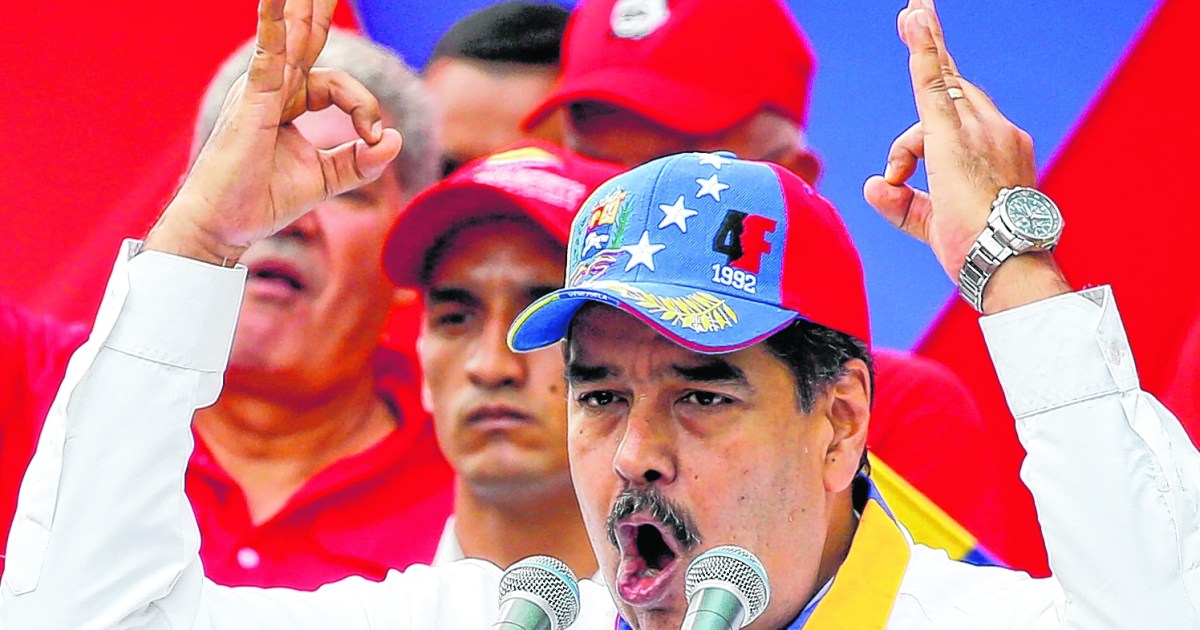Barbara Agelvis*
Nicolás Maduro announced his actions on national television.
Jail for “the fascists” and life imprisonment for “betrayal of the country”: the ruling Chavismo promotes a legal arsenal with which it promises to combat “conspiracies” of its rivals, while experts warn that in reality it seeks to “neutralize” any kind of criticism.
President Nicolás Maduro, who aspires to a third term in the presidential elections on July 28, proposes to reform the Constitution and establish life imprisonment for “corrupt people and traitors to the country,” in a country where the maximum sentence is 30 years.
Two projects that have raised alarm among lawyers and human rights activists are being debated at the same time in Parliament – controlled by Chavismo.
One, a law against fascism, a term that Maduro usually uses to disqualify his opponents, which contemplates prison sentences of up to 12 years. Another, legislation that proposes regulating the financing of NGOs, a frequent target of attacks from those in power.
“There are three proposals that have an intimidating effect in an electoral context,” the lawyer and director of the NGO Access to Justice, Alí Daniels, tells AFP. “The government is in a campaign of fear so that fear is what prevents people from voting.”
A little less than three months before the elections, the opposition denounces a campaign of harassment with the arrest of a dozen militants and collaborators of the opposition leader María Corina Machado, favorite in the polls but disqualified from facing Maduro, as well as activists of human rights, such as the expert on military issues Rocío San Miguel.
The government claims that it has dismantled multiple conspiracies to overthrow and even assassinate the president.
“Screw them”
Maduro proposed life in prison after his former Oil Minister, Tareck El Aissami, and dozens of other officials were arrested for embezzlement estimated at $17 billion from state-run PDVSA.
This involves a constitutional reform, which must go to Parliament and then be approved in a referendum.
“Let these people rot for life in prison!” exclaimed the president on April 13.
The charge of treason is usually brought against opponents, as are “hate crimes” contemplated in a 2017 law that establishes sentences of up to 20 years in prison.
“Almost all political prisoners are accused of this crime,” highlights sociologist Rafael Uzcátegui, from the NGO Peace Laboratory. “It is a very broad context.”
“Openly fascist”
The ‘Law against Fascism, Neofascism and Similar Expressions’ was proposed at the request of Maduro.
Approved in the first discussion in Parliament, the text was written “in response to what the last 25 years of Venezuela have been, where expressions and actions of organizations and parties of a frankly and openly fascist character have been manifested,” said its promoter. , Vice President Delcy Rodríguez.
The project, which can change in a second parliamentary discussion to be sanctioned, punishes the promotion of meetings or demonstrations that “apology for fascism.”
It also proposes the illegalization of political parties and fines of up to $100,000 for companies, organizations or media that finance activities or disseminate information that “incites fascism.”
But “virtually anything is fascism” for the government, questions Daniels. “It’s a vague concept.”
Rodríguez, for example, compared a Machado campaign slogan, “Until the end,” to Hitler’s “Final Solution.”
“Restrictive”
The law to regulate NGOs awaits its second discussion since January 2023. Its content was modified after its promoter, the powerful Chavista leader Diosdado Cabello, accused 60 organizations of “destabilization” maneuvers.
According to the project, organizations must register in a local registry and declare financing sources, usually foreign.
Failure to comply also carries fines that can reach $10,000.
Although there are similar regulations in the region in Cuba, Nicaragua, Guatemala and Bolivia, an independent UN mission noted that this law “is clearly aimed at limiting” the “right to association.”
“It is an absolutely restrictive package,” said Oscar Murillo, director of the NGO Provea.
* AFP journalist
